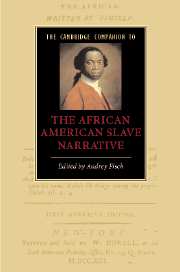Book contents
- Frontmatter
- Introduction
- Part I: The Slave Narrative and Transnational Abolitionism
- Part II: The Slave Narrative and Anglo-American Literary Traditions
- 5 Redeeming bondage: the captivity narrative and the spiritual autobiography in the African American slave narrative tradition
- 6 The slave narrative and the revolutionary tradition of American autobiography
- 7 The slave narrative and sentimental literature
- Part III: The Slave Narrative and the African American Literary Tradition
- Part IV: The Slave Narrative and the Politics of Knowledge
- Further Reading
- Index
6 - The slave narrative and the revolutionary tradition of American autobiography
from Part II: - The Slave Narrative and Anglo-American Literary Traditions
Published online by Cambridge University Press: 28 July 2007
- Frontmatter
- Introduction
- Part I: The Slave Narrative and Transnational Abolitionism
- Part II: The Slave Narrative and Anglo-American Literary Traditions
- 5 Redeeming bondage: the captivity narrative and the spiritual autobiography in the African American slave narrative tradition
- 6 The slave narrative and the revolutionary tradition of American autobiography
- 7 The slave narrative and sentimental literature
- Part III: The Slave Narrative and the African American Literary Tradition
- Part IV: The Slave Narrative and the Politics of Knowledge
- Further Reading
- Index
Summary
Is the slave narrative a subspecies or subgenre of autobiography? That is one of the large questions posed by John Sekora in his seminal “Black Message/ White Envelope,” a study of the crucial role that white abolitionists played in publishing, and indeed helping to shape, the antebellum slave narrative. Arguing that the slave narrative usually presents an account of a life “mandated by persons other than the subject,” and that the “black message” of the slave narrative therefore inevitably comes “sealed within a white envelope,” Sekora regards slave narratives as the products of a racist cultural process in which “white sponsors compel a black author to approve, to authorize, white institutional power.” That process, he says, necessitates the relative silencing of the black voice. Moreover, because the slave narrative, according to Sekora, emphasizes not the “individualized Afro-American life, but rather the concrete detail of lives spent under slavery,” he insists that it cannot do what autobiography typically does: creatively work with language and narrative to portray an individual self. Given his skepticism about black narrators' participatory role in the texts that just about always bear their names, Sekora's response to his rhetorically posed question about the status of the slave narrative as autobiography comes as no surprise: “the separately published [slave] narratives are thus not a subspecies of autobiography.”
- Type
- Chapter
- Information
- Publisher: Cambridge University PressPrint publication year: 2007
- 2
- Cited by



